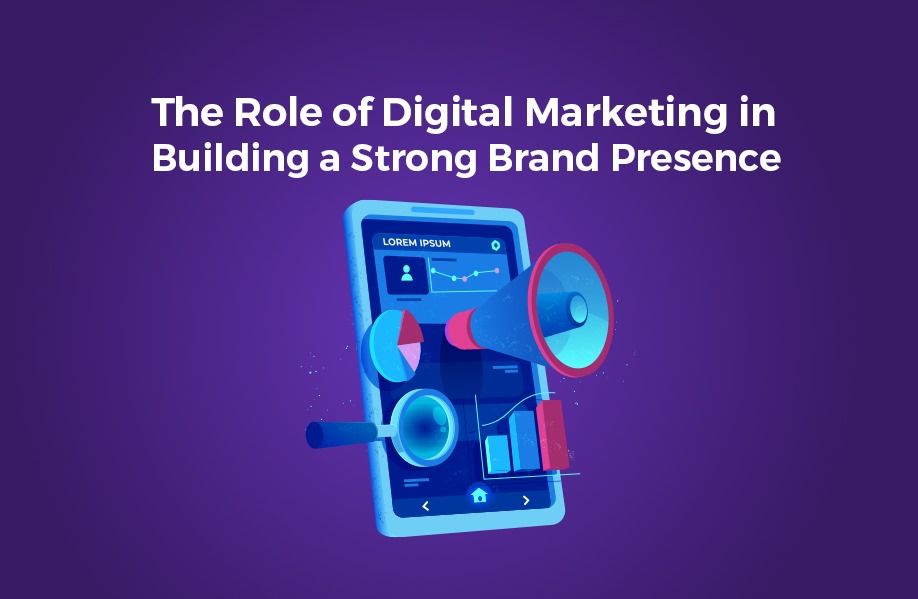In today’s digital age, building a strong brand presence is no longer a luxury—it’s a necessity for businesses aiming to thrive in competitive markets. Digital marketing has emerged as a powerful tool to help businesses establish their identity, engage with their target audience, and drive sustainable growth. Here’s an in-depth look at how digital marketing plays a pivotal role in building a robust brand presence:
1. Expanding Your Reach
Digital marketing allows businesses to break geographical barriers and connect with a global audience. Unlike traditional marketing methods, digital platforms such as social media, search engines, and email marketing provide businesses with the tools to reach potential customers anywhere in the world. Whether through localized campaigns or global strategies, digital marketing ensures your brand reaches its intended audience.
Social media platforms like Facebook, Instagram, LinkedIn, and TikTok offer unparalleled reach. For instance, by leveraging targeted advertising, businesses can connect with users based on demographics, interests, and behaviors, ensuring the right message reaches the right people at the right time.
2. Enhancing Brand Awareness
Digital marketing is instrumental in increasing brand visibility. With billions of users online, platforms such as Google Ads, social media ads, and influencer partnerships provide excellent opportunities to get your brand in front of a wide audience. Content marketing, in particular, is a game-changer. Blog posts, videos, infographics, and webinars allow businesses to showcase their expertise, solve customer pain points, and establish themselves as industry leaders.
SEO (Search Engine Optimization) also plays a significant role in brand awareness. By optimizing your website and content for search engines, your brand becomes more discoverable, ensuring that potential customers can find you when they search for products or services related to your industry.
3. Engaging with Your Target Audience
One of the most valuable aspects of digital marketing is its ability to facilitate direct interaction with your audience. Social media channels, for example, allow businesses to engage with customers through comments, likes, shares, and direct messages. This two-way communication fosters trust and loyalty, making customers feel valued and heard.
Email marketing is another effective way to maintain consistent communication with your audience. Personalized emails tailored to the preferences and behaviors of your customers can strengthen relationships and encourage repeat business.
4. Building a Consistent Brand Identity
Consistency is key when it comes to branding. Digital marketing enables businesses to create a unified brand voice across all online platforms. From your website and social media profiles to email campaigns and online ads, maintaining a consistent tone, color scheme, and messaging reinforces your brand identity.
Tools like Canva, Adobe Suite, and other branding software allow businesses to design visually appealing and cohesive content that resonates with their target audience. A consistent brand identity not only enhances recognition but also fosters trust and credibility.
5. Driving Customer Loyalty
Digital marketing doesn’t just attract new customers; it also helps retain existing ones. Loyalty programs, exclusive offers, and personalized recommendations are all strategies that can be executed through digital platforms. Social proof, such as customer testimonials, reviews, and case studies, also plays a critical role in building trust and encouraging repeat business.
Content marketing is particularly effective for nurturing loyalty. By regularly providing valuable, relevant, and engaging content, businesses can position themselves as reliable resources, ensuring customers return for more.
6. Leveraging Data and Analytics
One of the most significant advantages of digital marketing is the ability to measure and analyze results in real-time. Tools like Google Analytics, Facebook Insights, and email marketing platforms provide detailed metrics on campaign performance, audience engagement, and conversion rates.
This data allows businesses to refine their strategies, allocate resources effectively, and maximize ROI (return on investment). For example, if a particular social media campaign isn’t performing well, adjustments can be made instantly to improve outcomes.
7. Staying Ahead of Competitors
In a world where consumers are inundated with choices, standing out from the competition is critical. Digital marketing provides businesses with innovative ways to differentiate themselves. Creative ad campaigns, viral social media challenges, and interactive content such as polls and quizzes can help businesses capture attention and leave a lasting impression.
Competitor analysis tools like SEMrush and Ahrefs allow businesses to monitor competitor strategies, identify gaps, and capitalize on opportunities. By staying proactive and innovative, digital marketing helps businesses maintain a competitive edge.
8. Adapting to Evolving Consumer Behavior
Consumer behavior is constantly evolving, and digital marketing allows businesses to stay ahead of these changes. For example, the rise of mobile usage has made mobile optimization a necessity. Similarly, trends like voice search, video content consumption, and influencer marketing have reshaped how brands connect with their audiences.
By embracing these trends and integrating them into their digital strategies, businesses can ensure they remain relevant and meet the changing needs of their customers.
9. Cost-Effective Marketing Solutions
Compared to traditional marketing methods, digital marketing is more cost-effective and offers a higher ROI. Pay-per-click (PPC) advertising, for example, ensures businesses only pay for actual clicks, making it a budget-friendly option. Social media marketing and email campaigns also allow businesses to reach a large audience without breaking the bank.
Small businesses, in particular, can benefit from the affordability of digital marketing, leveling the playing field and competing with larger companies.
10. Creating Emotional Connections
Digital marketing goes beyond selling products or services; it’s about creating emotional connections with your audience. Storytelling through blogs, videos, and social media posts allows brands to connect on a deeper level, resonating with customers’ values, aspirations, and challenges.
Humanizing your brand by showcasing behind-the-scenes content, employee stories, and community involvement builds authenticity and strengthens relationships.
Conclusion
In today’s competitive landscape, digital marketing is the cornerstone of building a strong brand presence. It empowers businesses to reach wider audiences, engage meaningfully, and create lasting impressions. At Oracle Media, we specialize in crafting innovative digital marketing strategies tailored to your unique goals. Let us help you harness the power of digital marketing to elevate your brand, connect with your audience, and achieve sustainable growth. Together, we can transform your vision into a thriving digital presence that stands out in the ever-changing online world.


Share: